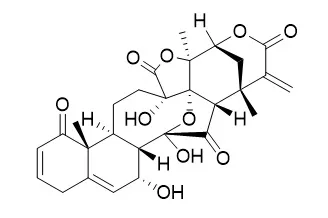| Kinase Assay: |
| Oncotarget. 2016 Feb 23; 7(8): 9462–9476. | | Physalin A exerts anti-tumor activity in non-small cell lung cancer cell lines by suppressing JAK/STAT3 signaling[Pubmed: 26843613] | The signal transducers and activators of transcription 3 (STAT3) signaling pathway plays critical roles in the pathogenesis and progression of various human cancers, including non-small cell lung cancer (NSCLC).
METHODS AND RESULTS:
In this study, we aimed to evaluate the therapeutic potential of Physalin A, a bioactive withanolide derived from Physalis alkekengi var. francheti used in traditional Chinese medicine, was evaluated in human NSCLC cells. Its and determined whether it effect oninhibited both constitutive and induced STAT3 activity, through repressing the phosphorylation levels of JAK2 and JAK3, resulting in anti-proliferation and pro-apoptotic effects on NSCLC cells was also determined, and. theThe antitumor effects of Physalin A were also validated usingin an in vivo mouse xenograft models of NSCLC cells. Physalin A had anti-proliferative and pro-apoptotic effects in NSCLC cells with constitutively activated STAT3; it also suppressed both constitutive and induced STAT3 activity by modulating the phosphorylation of JAK2 and JAK3. Furthermore, Physalin A abrogated the nuclear translocation and transcriptional activity of STAT3, thereby decreasing the expression levels of STAT3, its target genes, such as Bcl-2 and XIAP. Knockdown of STAT3 expression by small interfering RNA (siRNA) significantly enhanced the pro-apoptotic effects of Physalin A in NSCLC cells. Moreover, Physalin A significantly suppressed tumor xenograft growth.
CONCLUSIONS:
Thus, as an inhibitor of JAK2/3-STAT3 signaling, Physalin A, has potent anti-tumor activities, which may facilitate the development of a therapeutic strategy for treating NSCLC. | | Mol Cell Biochem. 2016 Apr;415(1-2):145-55. | | Physalin A induces G2/M phase cell cycle arrest in human non-small cell lung cancer cells: involvement of the p38 MAPK/ROS pathway.[Pubmed: 27000859 ] | Physalin A (PA) is an active withanolide isolated from Physalis alkekengi var. franchetii, a traditional Chinese herbal medicine named Jindenglong, which has long been used for the treatment of sore throat, hepatitis, and tumors in China.
METHODS AND RESULTS:
In the present study, we firstly investigated the effects of PA on proliferation and cell cycle distribution of the human non-small cell lung cancer (NSCLC) A549 cell line, and the potential mechanisms involved. Here, PA inhibited cell growth in dose- and time-dependent manners. Treatment of A549 cells with 28.4 μM PA for 24 h resulted in approximately 50 % cell death. PA increased the amount of intracellular ROS and the proportion of cells in G2/M. G2/M arrest was attenuated by the addition of ROS scavenger NAC. ERK and P38 were triggered by PA through phosphorylation in a time-dependent manner. The phosphorylation of ERK and P38 were not attenuated by the addition of NAC, but the use of the p38 inhibitor could reduce, at least in part, PA-induced ROS and the proportion of cells in G2/M. PA induces G2/M cell cycle arrest in A549 cells involving in the p38 MAPK/ROS pathway.
CONCLUSIONS:
This study suggests that PA might be a promising therapeutic agent against NSCLC. |
|






 Cell. 2018 Jan 11;172(1-2):249-261.e12. doi: 10.1016/j.cell.2017.12.019.IF=36.216(2019)
Cell. 2018 Jan 11;172(1-2):249-261.e12. doi: 10.1016/j.cell.2017.12.019.IF=36.216(2019) Cell Metab. 2020 Mar 3;31(3):534-548.e5. doi: 10.1016/j.cmet.2020.01.002.IF=22.415(2019)
Cell Metab. 2020 Mar 3;31(3):534-548.e5. doi: 10.1016/j.cmet.2020.01.002.IF=22.415(2019) Mol Cell. 2017 Nov 16;68(4):673-685.e6. doi: 10.1016/j.molcel.2017.10.022.IF=14.548(2019)
Mol Cell. 2017 Nov 16;68(4):673-685.e6. doi: 10.1016/j.molcel.2017.10.022.IF=14.548(2019)